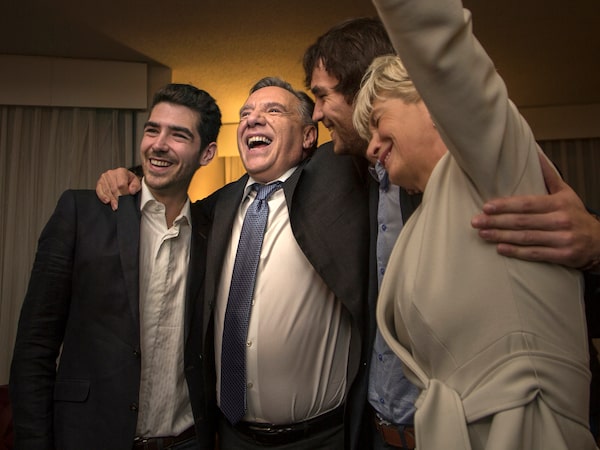- CAQ are projected to win a historic majority.
- CAQ Leader François Legault will be the province’s next premier.
- Jean-François Lisée resigned as PQ Leader after the party lost its official status and lost his seat in his riding of Rosemont.
- Liberal Leader Philippe Couillard won his own riding in Roberval.
- Quebec Solidaire co-spokespeople Gabriel Nadeau-Dubois and Manon Masse both won their ridings as the party tripled the amount of seats it held from the last election.
- Watch results roll in on our live map.

François Legault celebrates the results with his wife Isabelle Brais and sons Victor (L) and Xavier of the elections with his family in Quebec city.Roger Lemoyne/The Globe and Mail
The Coalition Avenir Quebec shattered nearly a half-century of two-party political rule in Quebec on Monday by winning a majority government that will redraw the province’s electoral map.
The party was elected or leading in nearly 75 of the province’s 125 ridings, compared with about 35 for the incumbent Liberals.
Coalition Leader Francois Legault guided his right-leaning, seven-year-old party to victory following a 39-day campaign.
The QS had the same number of ridings as the PQ but had broken out of the island of Montreal and had now clinched ridings in other regions, such as Quebec City riding of Taschereau, traditionally a PQ stronghold, or Sherbrooke. A jubilant QS co-spokesperson Gabriel Nadeau-Dubois told supporters that they were now in the same league as the other established parties.
“It’s a giant step for ordinary folks,” he said. “... next it’ll be the ordinary folks who’ll take power in Quebec.”
At dissolution, Liberals held 68 seats, Parti Québecois held 28 seats, Coalition Avenir Québec held 21 seats, and Québec solidaire held 3 seats. Five MNAs were not a member of any party.
The Liberals held power in the province for 13 of the last 15 years, except for a brief PQ minority government from 2012 to 2014. A CAQ victory marks the first time in nearly 50 years that the province would be led by a party other than the Liberals or the PQ.
Quebec’s outgoing Liberal premier, Mr. Couillard, says he will spend the next few days reflecting on his future. He went on to say it is clear voters want change.
NOTABLE RESULTS
Coalition Avenir Quebec Leader Francois Legault won his riding of L’Assomption, a riding in northeast of Montreal.
Liberal Leader Philippe Couillard won his own riding in Roberval, a riding he’s represented since 2014. Mr. Couillard wrote on Twitter that he’d contacted Mr. Legault to congratulate him on his victory.
Quebec Solidaire’s co-spokesperson Gabriel Nadeau-Dubois was re-elected in his Montreal riding of Gouin. The 28-year-old was thrust into the spotlight during the 2012 student protests in Montreal and won his seat in a byelection five years later. Fellow co-spokesperson Manon Masse won her own riding, as well.
Quebec Solidaire also won its first seat outside of Montreal. Catherine Dorion has been elected in the Quebec City riding of Taschereau, which was left vacant by the Parti Quebecois’ Agnes Maltais.
Meanwhile, in his riding, PQ Leader Jean-François Lisée lost his seat to QS star candidate Vincent Marissal.
The PQ, which shaped Quebec and Canadian politics for decades, is currently registering its worst performance since its creation half a century ago.
The PQ had won or was leading in only 10 ridings and had only garnered about 17.5 per cent of the vote, a score that could strip it of official party status in the legislature. (Official status and the financing attached to it require 12 seats or 20 per cent of the vote.)